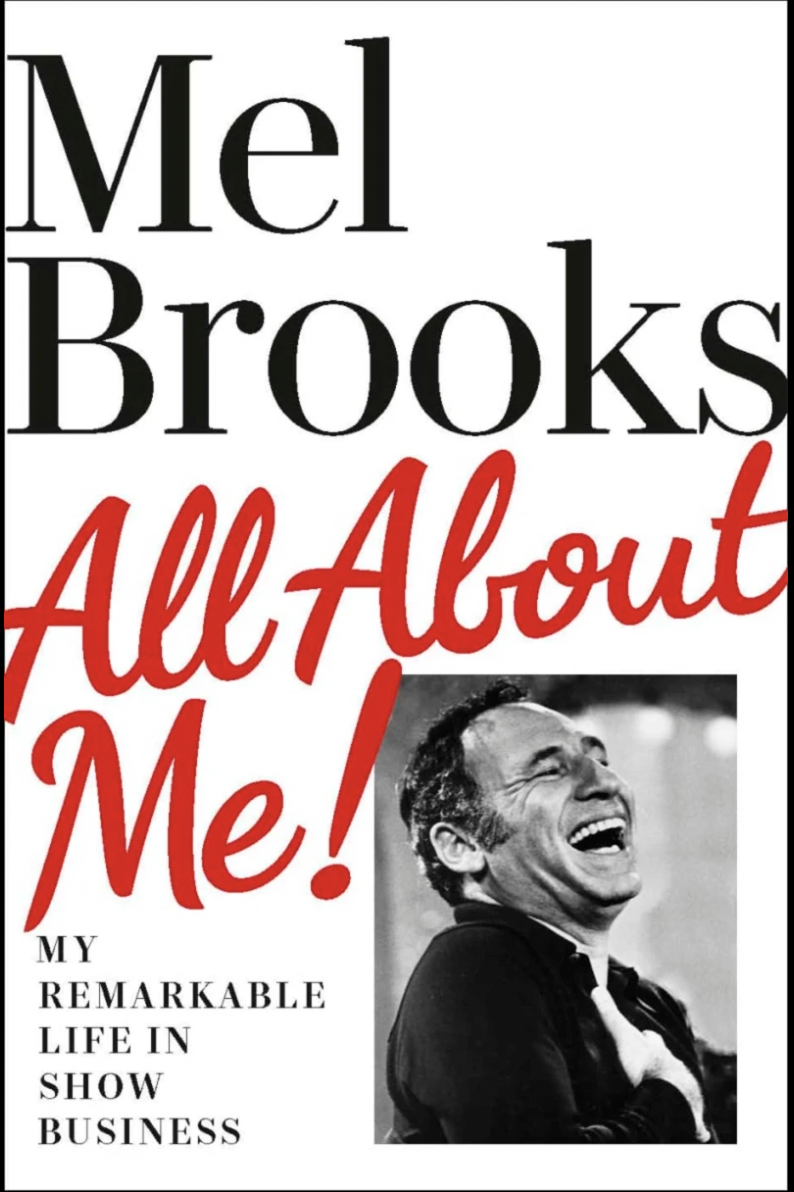
“All About Me: My Remarkable Life in Show Business”
By Mel Brooks
Memoir
By Rita Plush
No stranger to the pen Mel Brooks has written a neat dozen tomes including this one. Now the 95-year-old Brooks details his life in full. In easy to digest chapters, the funny man takes readers from his early years in Brooklyn as a depression-era kid to the recipient of the National Medal of Arts at the White House, with stops on TV, the big screen and Broadway.
Called “a national treasure” by Vincent Canby of The New York Times, Brooks is one of the few showbiz folks to win an EGOT (Emmy, Grammy, Oscar and Tony awards). No doubt about it, the man who has kept the world laughing for decades has plenty to brag about. But it turns out the book is not all about him. Readers will discover his generous side, as he praises the many comics he has learned from.
Old-timers like the Ritz brothers had “a physical insanity,” Brooks says, while the Marx brothers were “more intellectual,” and Brooks comes clean that he took from both. “You might say I’m an intellectual meschugana.” (Yiddish for crazy.) He also credits Charlie Chaplin, when he (Brooks) was trying to manage a Murphy bed in “Silent Movie” and falls on his backside, “much like Chaplin had done sixty years earlier.”
Story, character, plotting, timing and staging, they’re all part of crafting a joke according to Brooks. And he should know; he’s been at it since he’s 6 years old.
Short for his age, he was bullied early on. Humor was a way of making friends. “Words were my equalizer.”
The youngest of four brothers, the darling of his entire family, Brooks’ shtick (a comic theme or gimmick) got him both attention and affection, but when he realized as a teen that he wasn’t “getting kissed for being Melvin anymore,” he knew he had to go out and earn it. He “needed to be kissed for being somebody.” And it couldn’t be his father who died when Brooks was 2 years old, “… a brushstroke of depression that really never left me.” But other than that bit of introspection, he keeps the sad times down and the anecdotes up and coming.
His training began on Brooklyn street corners. “You had to score on the corner. No bullshit routines. It had to be ‘Lemme tell ya what happened today…’ You really had to be good on your feet.” His early years make for fascinating reading, as the way in which his brilliant comic mind shines. Everything he sees and experiences is fodder for future material.
In 1947 Brooks met a down, but not quite out, movie producer who strung his drying underwear and socks on a clothesline in his office. Twenty years later, said producer is morphed into Max Bialystock, who with his cohorts, scam elderly women into investing in a sure-to-fail musical about Hitler, who becomes a rousing success in “The Producers.” And while I’m high on endorphins, I’ll segue into “High Anxiety,” another smash, this one spoofing Alfred Hitchcock’s masterful suspense movies.
Brooks was a “fierce devotee” of Hitchcock who worked with him on the movie. He dedicated the movie to him, and was very keen on getting his approval. At the premier screening, Hitchcock sat next to him and only laughed once. Perhaps it was when Brooks, miming Frank Sinatra, flips the mic cord over his shoulder, saunters around the crowd, and instead of singing “High anxiety…” he belts out “Oooo ‘ziety….” Brooks was devastated, but he needn’t have had any ‘ziety, because soon after, a congratulatory note from “Hitch,” as he was known to his
friends, came to Brooks’ office thanking him for the “splendid entertainment,” along with six bottles of fine French wine. (Brooks is known a wine connoisseur.)
His love affair with Anne Bancroft is Hollywood legend, and a more unlikely pair is hard to imagine. Bancroft was a beautiful, elegant woman, and Brooks was, well… Mel Brooks. But it wasn’t just appearance-wise that they differed. Career wise, Bancroft was an established dramatic actress and Brooks, a struggling comedian (she paid for their early dates, slipping him a twenty under the table.) The famous couple was legendary on Fire Island, residing in Lonelyville for many summers. They clicked from the get go and laughed and loved through 40 years of marriage until Bancroft died of uterine cancer.
Author, laugh meister extraordinaire, filmmaker, husband, father and grandfather – also drummer and combat engineer in WWII – the boychick (Yiddish endearment for a son) has lived. Ask the man what has the most to say about the human condition, and no surprise there, he will tell you it’s comedy. “Because if you can laugh, you can get by. You can survive when things are bad if you have a sense of humor.” And Brooks’ silly/zany/over the top sense of humor has helped millions get by. May his life continue in health, and may the Schwartz be with him.




























